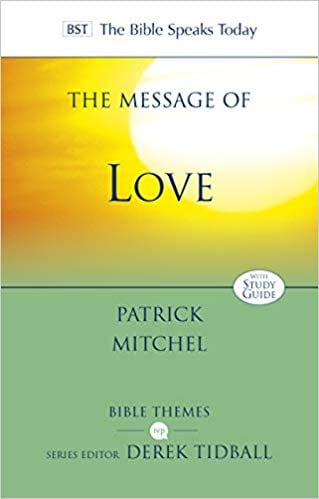336 pages $12.49 paperback on Amazon
BEN: Patrick, this book is splendid, but it’s also rather like eating rich fudge…. one needs to chew it a little bit at a time to take it all in. How long did you work on this book to get it into this final form, and why did you decide to focus on the particular topic of love?
PATRICK: First, thank you Ben for your kind words, they mean a lot coming from you – and I’m obviously not as disciplined as you when it comes to fudge!
The book took a couple of years, squeezing writing time into every bit of life. I felt compelled to write about love for a number of reasons. First, while any attentive reader of the Bible is aware that love is important, what we actually believe about love is often ill-defined or assumed. Yet, it only takes a bit of probing to realize that there are all sorts of biblical, theological and pastoral questions raised by this little four-letter word. Second, despite the fact that Christians talk and sing about the love of God all the time, it is a surprisingly neglected topic in academic theology and in the teaching of the church. For example, in the IVP Bible Speaks Today Themes Series there were 20 volumes published but not one on love. That’s remarkable isn’t it? I happened to mention this to Derek Tidball, the series editor and my former PhD supervisor, over lunch one day and things took off from there.
BEN: One of the things I appreciated about the book is while it has good detailed and contextual exegesis of particular relevant texts, it also takes a pastoral approach to providing guidance of how this material is relevant and can be applied today. You didn’t leave the discussion up in the air with nice abstractions. Unfortunately, this is all too rare in theologically and ethically rich monographs like this. Why do you think that is? Aren’t we as Christian scholars supposed to be mainly doing this in service to the church?
PATRICK: The BST series is designed to expound the biblical text, relate it to contemporary life and be readable! This emphasis came from John Stott the series founder who, as you know, modeled it in his entire life and ministry. I did my best to fulfill that goal through focus on seventeen selected texts. My prayer is that it will give individual readers, preachers and anyone interested in Christianity a fresh vision of the love of God and his agenda for his people to be communities of love within the world. There is a study guide which should be particularly useful for groups.
In answer to your last question, yes I believe passionately that Christian scholarship should be done to help enable and equip believers to live lives of faithful discipleship to Jesus. When Christian academics end up talking only to their colleagues within the academy something has gone seriously awry. I understand why this happens. There are enormous pressures on young scholars to publish; it’s crucial to gain academic credibility and to finding employment in a hyper-competitive work environment. And so subtly, and without intention, focus shifts to writing primarily for ‘peers and careers’ rather than the church. It also comes up several times in the book how theological education has been profoundly shaped by an Enlightenment framework that prizes rationalism, propositions and systematics. A theme that emerges is the need to reappropriate a holistic vision of Christian theological education that embraces ‘head’, ‘heart’ and ‘hands’ – with ‘heart’ (character and virtue, especially love) being the core from which the others radiate. But to really do that will need a radical transformation in how much theological education is done.













